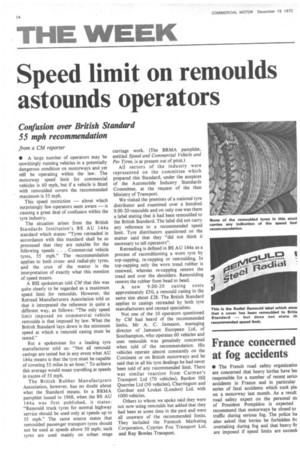Speed limit on remoulds astounds operators
Page 16

If you've noticed an error in this article please click here to report it so we can fix it.
Confusion over British Standard 55 mph recommendation
from a CM reporter
• A large number of operators may be unwittingly running vehicles in a potentially dangerous condition on motorways and yet still be operating within the law. The motorway speed limit for commercial vehicles is 60 mph, but if a vehicle is fitted with remoulded covers the recommended maximum is 55 mph.
This speed restriction — about which surprisingly few operators seem aware — is causing a great deal of confusion within the tyre industry.
The situation arises from the British Standards Institution's BS AU 144a standard which states: "Tyres retreaded in accordance with this standard shall be so processed that they are suitable for the following speeds . . . Commercial vehicle tyres, 55 mph." The recommendation applies to both crossand radial-ply tyres, and the crux of the matter is the interpretation of exactly what this mention of speed means.
A BSI spokesman told CM that this was quite clearly to be regarded as a maximum speed limit for remoulds. However, the Retread Manufacturers Association told us that it interpreted the reference in quite a different way, as follows: "The only speed limit imposed on commercial vehicle remoulds is that imposed by law. What the British Standard lays down is the minimum speed at which a remould casing must be tested."
But a spokesman for a leading tyre manufacturer told us: "Not all remould casings are tested but in any event what AU 144a means is that the tyre must be capable of covering 55 miles in an hour." To achieve this average would mean travelling at speeds in excess of 55 mph.
The British Rubber Manufacturers Association, however, has no doubt about what the Standard means. In a BRMA pamphlet issued in 1968, when the BS AU 144a was first published, it states: "Remould truck tyres for normal highway service should be used only at speeds up to 55 mph." The same source states that remoulded passenger transport tyres should not be used at speeds above 50 mph; such tyres are used mainly on urban stage carriage work. (The BRMA pamphlet, entitled Speed and Commercial Vehicle and Psv Tyres, is at present out of print.) All sectors of the industry were represented on the committee which prepared this Standard, under the auspices of the Automobile Industry Standards Committee, at the request of the then Ministry of Transport.
We visited the premises of a national tyre distributor and examined over a hundred 9.00-20 remoulds and on only one was there a label stating that it had been remoulded to the British Standard. The label did not carry any reference to a recommended speed limit. Tyre distributors questioned on the matter said that they "did not think it necessary to tell operators".
Retreading is defined in BS AU 144a as a process of reconditioning a worn tyre by top-capping, re-capping or remoulding. In top-capping only the worn tread rubber is renewed, whereas re-capping renews the tread and over the shoulders. Remoulding renews the rubber from bead to bead.
A new 9.00-20 casing costs approximately £50, a remould casing in the same size about £28. The British Standard applies to casings retreaded by both tyre manufacturers and retread specialists.
Not one of the 10 operators questioned by CM had heard of the recommended limits. Mr A. C. Jameson, managing director of Jameson European Ltd, of Southampton, who operates 60 vehicles and uses remoulds was genuinely concerned when told of the recommendation. His vehicles operate almost constantly on the Continent or on British motorways and he said that in all his tyre dealings he had never been told of any recommended limit. There was similar reaction from Carman's Transport Ltd (70 vehicles), Bardon Hill Quarries Ltd (50 vehicles), Charrington and Gardner and Locket (London) Ltd, with 1000 vehicles.
Others to whom we spoke said they were not now using remoulds but added that they had been at some time in the past and were all unaware of the recommended limits. They included the Fatstock Marketing Corporation, Cyprien Fox Transport Ltd, and Ray Bowles Transport.




































































































